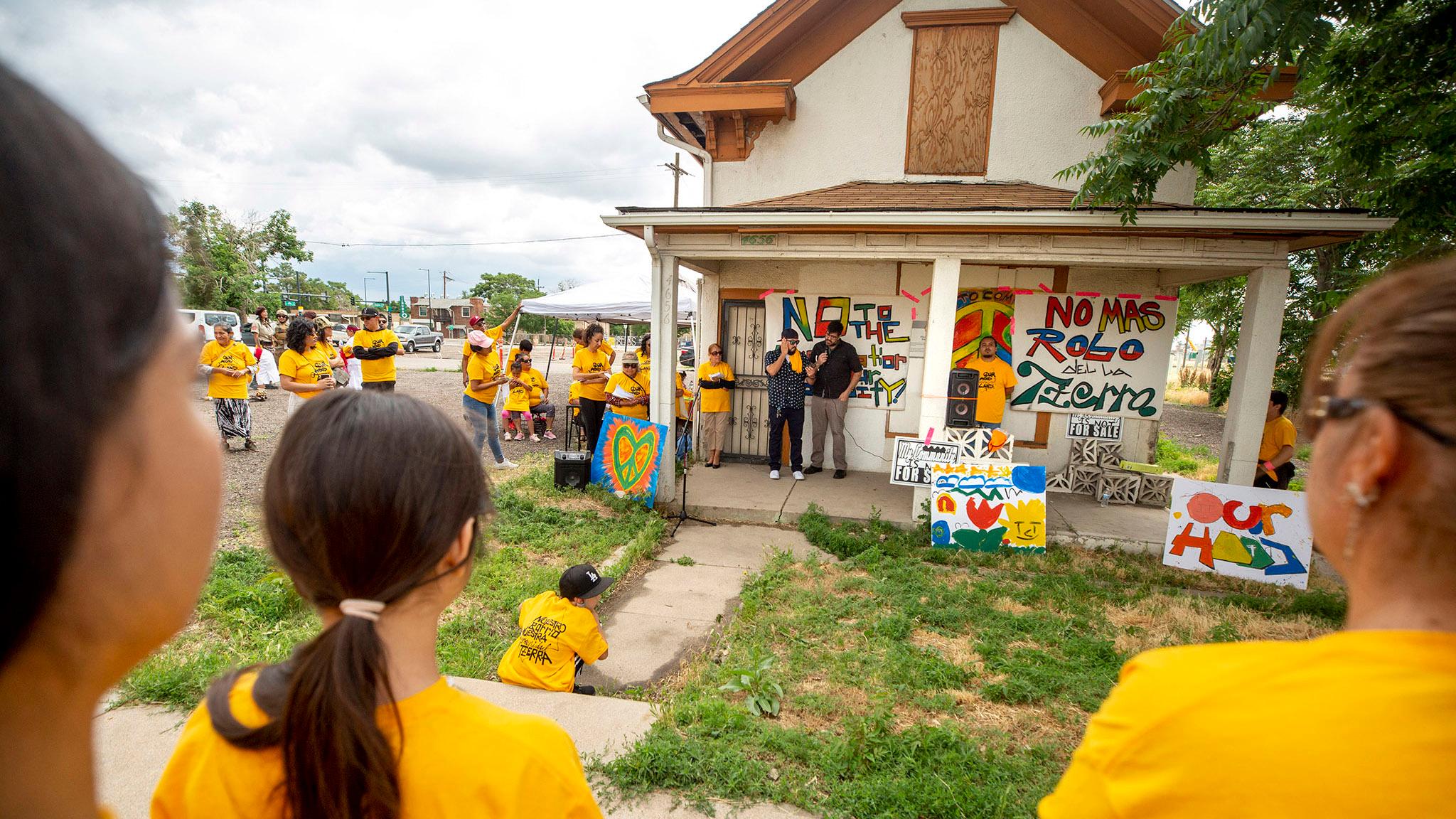Two groups of north Denver activists marched to an abandoned house off Brighton Boulevard on Saturday. The march from the heart of Elyria Swansea carried signs, like one that read "No to the exploitation of our community!" The group from Globeville brought drums.
When they arrived, two women blessed the spot with a ceremony honoring the four directions and the rightful, Indigenous owners of the land. Then, David Torres spoke on the front porch of the home, which sat alone surrounded by vacant lots.
"This land was stolen from myself, family and neighbors in modern times. This is the second home stolen from us in my 35 years of life," he said. "Today we come together to say 'No more.' The only way to stop continued displacement is to stand together."
Torres lived across the street until 1999, when the government scraped his home for a new onramp to I-70. His family moved, then lost their second house after the city acquired it to make room for the new National Western Center. They were forced to move out, even though the building survived as others were razed around it. Authorities decided to let it stand as they explored "adaptive reuse" of the structure, which enraged Torres even more. He might have fought harder had he known the structure would be deemed a "key historic property."
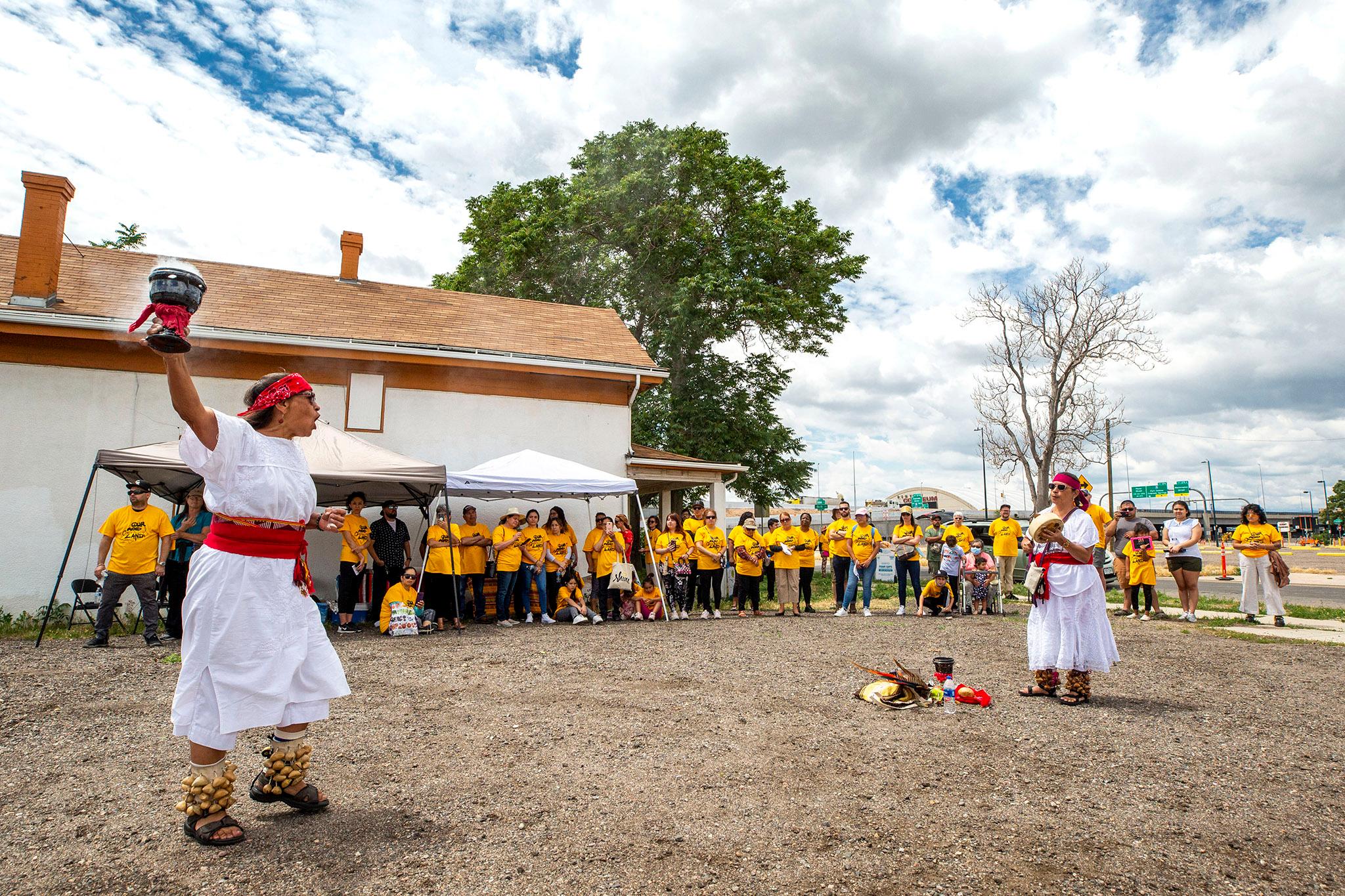
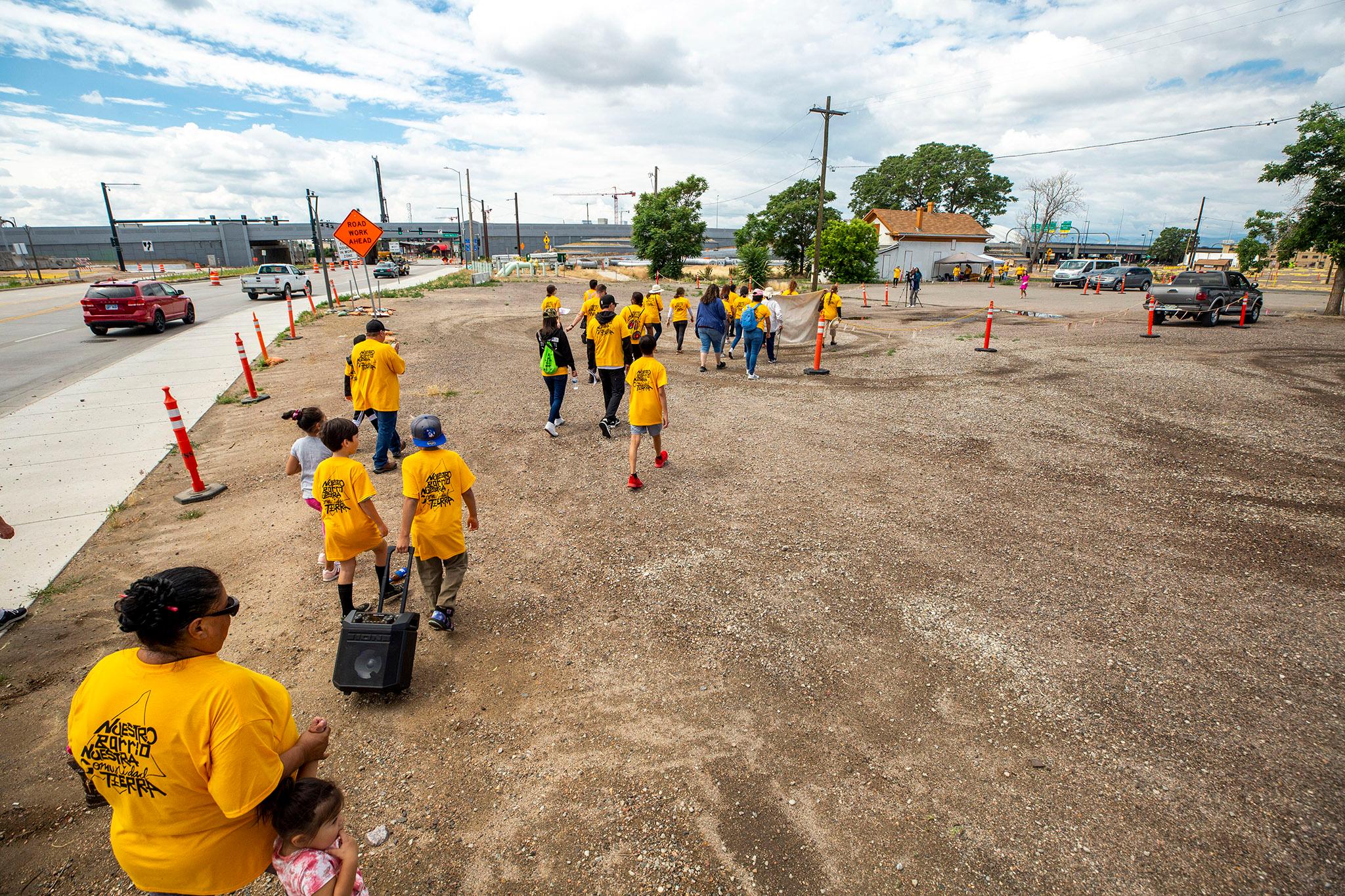
His old home sits on land known as the "Triangle," though the city now refers to it as "future phases." Until last year, it was slated to become one of Denver's newest "public-private partnerships," or P3s, in which companies help the city subsidize development costs in exchange for long-term profits. Members of the Globeville Elyria Swansea (GES) Coalition worried about the project, which is part of the transformation of the National Western Center that encompasses a huge swath of north Denver. They saw plans for new entertainment venues as signs that this place wasn't for them, or for people who were forced to leave. They envisioned a future when the new attractions would raise property values to the point that more would have to move out of the neighborhood, without ever benefitting from the new amenities.
The Triangle's P3 agreement fizzled during the pandemic recession, when Denver lost cashflow and Mayor Michael Hancock paused bidding for the development. The idea is not dead, but activists see an opening to change the course of history for this land, to keep historic residents in their homes and give neighbors more power in the decisions shaping this place. They are putting forward an alternate proposal.
On Saturday, on Torres' old front porch, they said it could be a moment for true reparations for people long displaced and disadvantaged in Denver.
What about a "power-sharing partnership?"
In short, said Nola Miguel, the GES Coalition's director, the group wants to see a development that's integral to those left in the surrounding neighborhoods. They envision a place where local business owners in this "very local economy" can build wealth, where neighbors can buy fresh food and where people with modest incomes can afford to live.
To underscore the point, Miguel paid Jose Hurtado to make elote for the protesters gathered off Brighton Boulevard. Steam rose from his cooler as he scooped hot corn into cups and piled butter and spices on top. This, she said, is the kind of person who should benefit from any new construction.
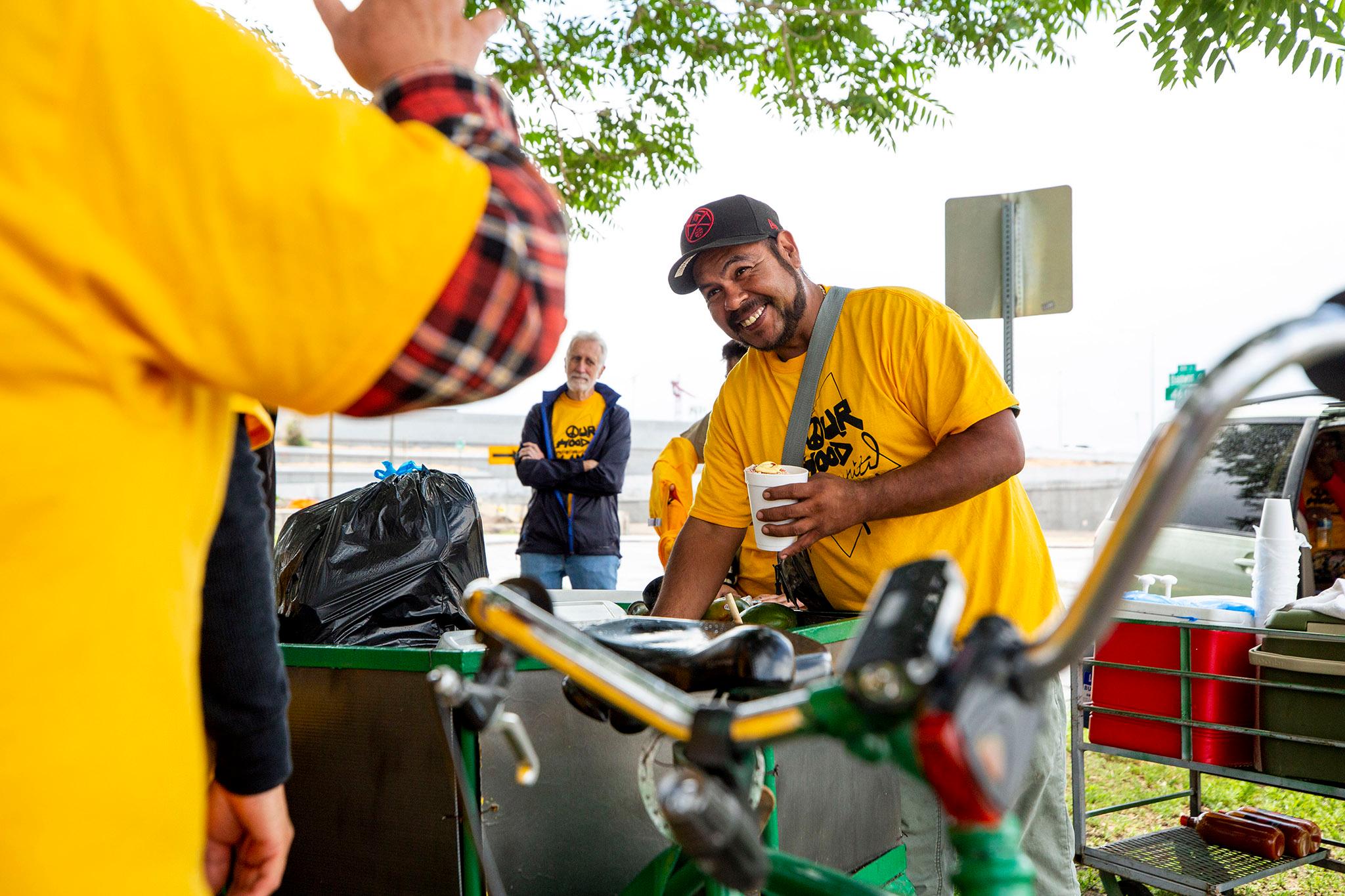

Jenna Espinoza-Garcia, communications director for the Mayor's Office of the National Western Center, told us her office envisions "a mixed-use area with a public food market, an arena and other public assets, as well as housing (which would include affordable housing) and more." People who live nearby will have access to the new riverwalk that's nearing completion a little further west, which will be surrounded by Colorado State University's new Spur campus. Residents of the 80216 zip code will also be eligible for up to $10,000 in scholarships to attend CSU programs.
But Miguel and her colleagues haven't been swayed.
She said people learned hard lessons after the I-70 renovation was finally approved. Dozens of people lost homes to eminent domain acquisitions, and many did not remain in the city. She's also spent a lot of time thinking about people forced to leave Auraria after the city acquired and scraped homes for a new campus there in the 1960s.
The city has "failed on their efforts to involve the community" when it comes to big-picture decision-making, Miguel told us. Yes, they held public meetings, but they just "come and bring their agenda and lecture everyone."
"There's no actual community control components, like real community partnership," she said.
Espinoza-Garcia told us that officials have done more than present slideshows. She pointed to a "citizens advisory committee," which has met regularly since 2013 and includes a member of the GES Coalition, and the National Western Center Authority Board of Directors, whose 13-members includes one local "community activist" among the businessmen and policy experts. She also noted more than 70 percent of residents in Globeville and Elyria Swansea voted to approve funds for the National Western redevelopment and Colorado Convention Center in 2015.
"Longtime neighbors and the broader Denver community have helped shape the National Western Center from the start," she wrote to us in an email. "We have worked together to ensure that campus redevelopment, programs and revenues benefit our community -- especially our closest neighbors in Globeville and Elyria-Swansea."
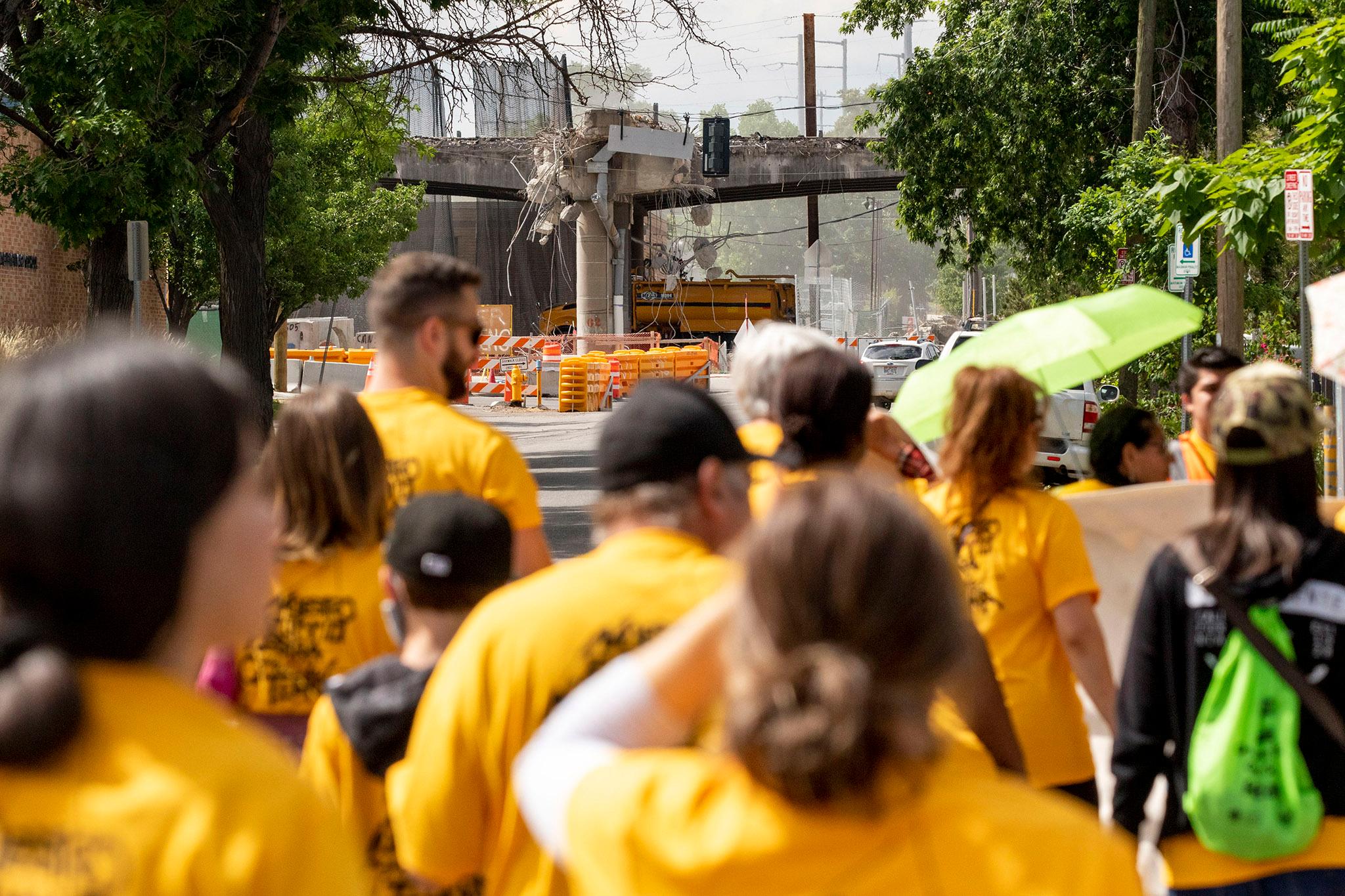
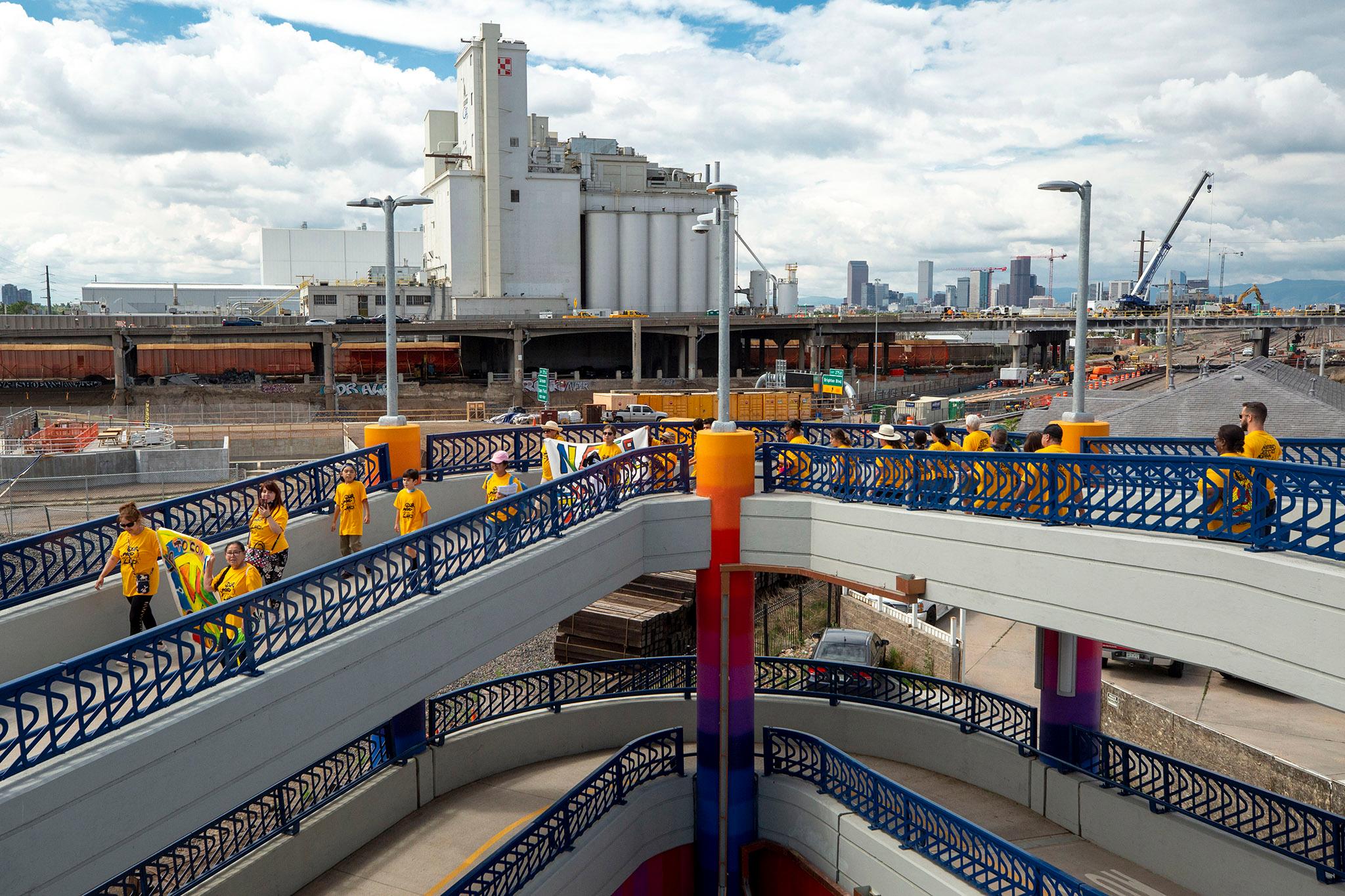
Still, the group on Saturday would like to see more.
Instead of a "public-private partnership," the coalition has laid out a vision for a "power-sharing partnership."
They spent three years canvassing neighborhood streets, collecting feedback from locals and brewing up an alternative plan, working with groups like Denver Homeless Out Loud and the Denver Indian Family Resource Center's Native American Housing Circle. They released their proposal, called "We Decide The Future," before they began marching on Saturday.
In it, they trace Denver's history from forcible removal of Indigenous tribes through redlining that prevented people of color from gaining generational wealth. Then, they describe a setup in which the Triangle could be owned by a community land trust, which the GES Coalition has already used to buy land and build homes nearby. What to build on top, they assert, could be the decision of local residents in collaboration with city leaders.
"GES Coalition's organizing model for building collective power relies on 'Group Centers' and 'power sharing' between neighbors who have been most historically targeted for extraction," their report reads. "This organizing model deliberately imparts peer analysis (between neighbors) and perspectives on neighborhood-level social bonds and relationships, collective grassroots power, with a focus on social issues connected to policy and health/housing stability, and social change."
"Reparations" don't necessarily mean cash handouts. There could be a lot of ways to compensate people living with generational inequities.
Ruben Sanchez, a member of the GES Coalition who helped shepherd marchers from Swansea to David Torres' house, told us a power-sharing agreement in Elyria Swansea could also suffice.
The push to move the needle on reparations grew during widespread social justice movements last year. Last week, Axios reported that Mayor Hancock recently became the co-leader of a group of ten U.S. mayors who are exploring how to compensate the descendants of enslaved people using city coffers. It's not clear yet whether a development project could fit Hancock's definition of "reparations," and if he thinks people displaced by development should be eligible for that kind of restorative program.
Sanchez said he hopes the conversation over compensation will grow beyond helping Black communities.
"You deserve it, but so does everybody else," he said.
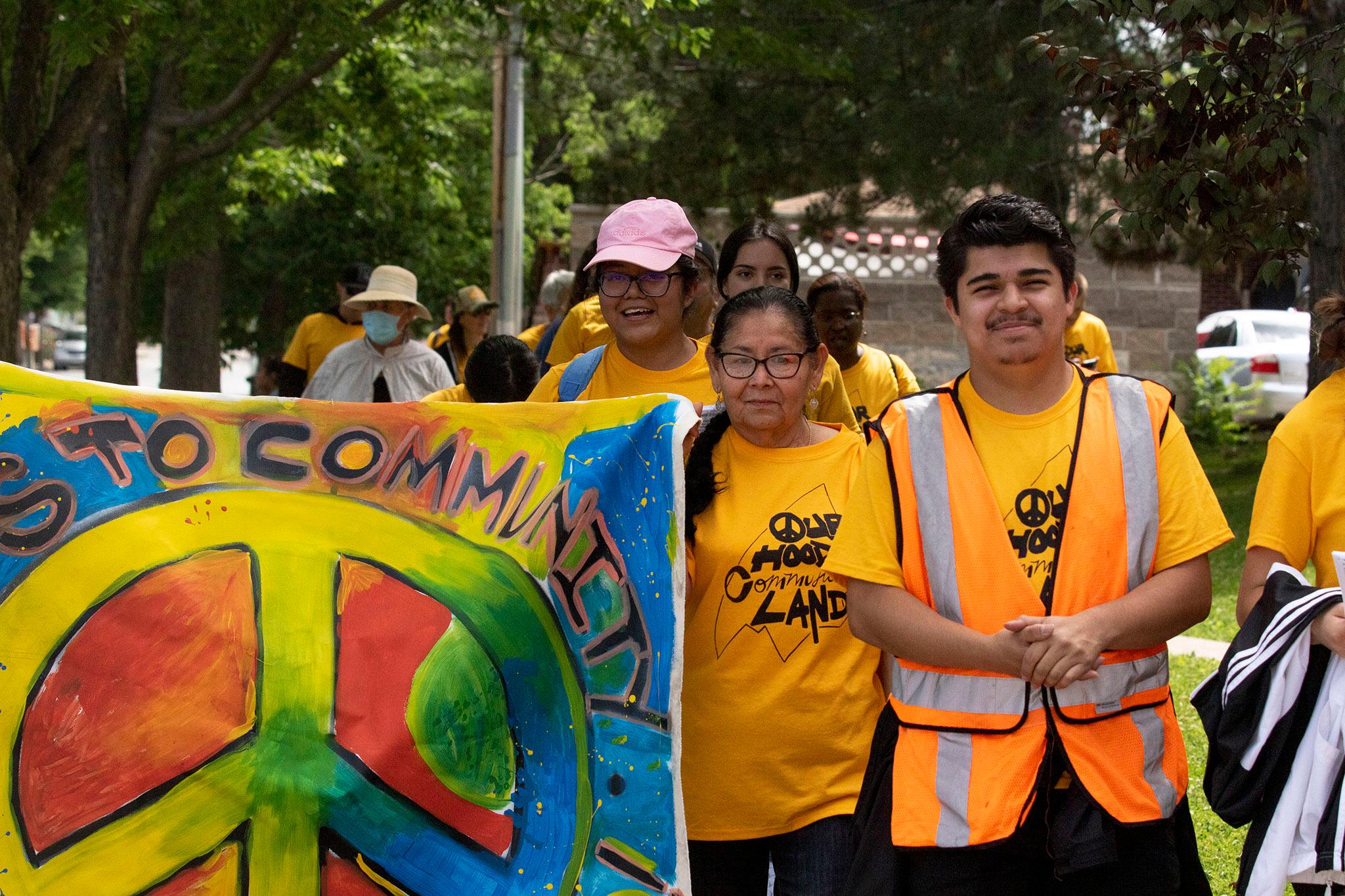
Miguel said the same forces that result in poor health and economic outcomes for Black residents also impact people in these neigborhoods.
"All of us in solidarity are impacted by oppressive systems that we want to change together," she said.
Be it people whose tribal ancestors were forced away 100 years ago or others, like Torres, who were dispersed from neighborhoods in recent memory, advocates on Saturday made it clear the Triangle could be one answer to a history of structural inequity.
"They do not create wealth, they take it through exploitation," Poncho Espino said into a microphone from Torres' former porch. "They do not create much needed infrastructure in housing, they merely rob us of the opportunity to have it. The city is determined to follow a policy of displacement and dispossession that will stop here."
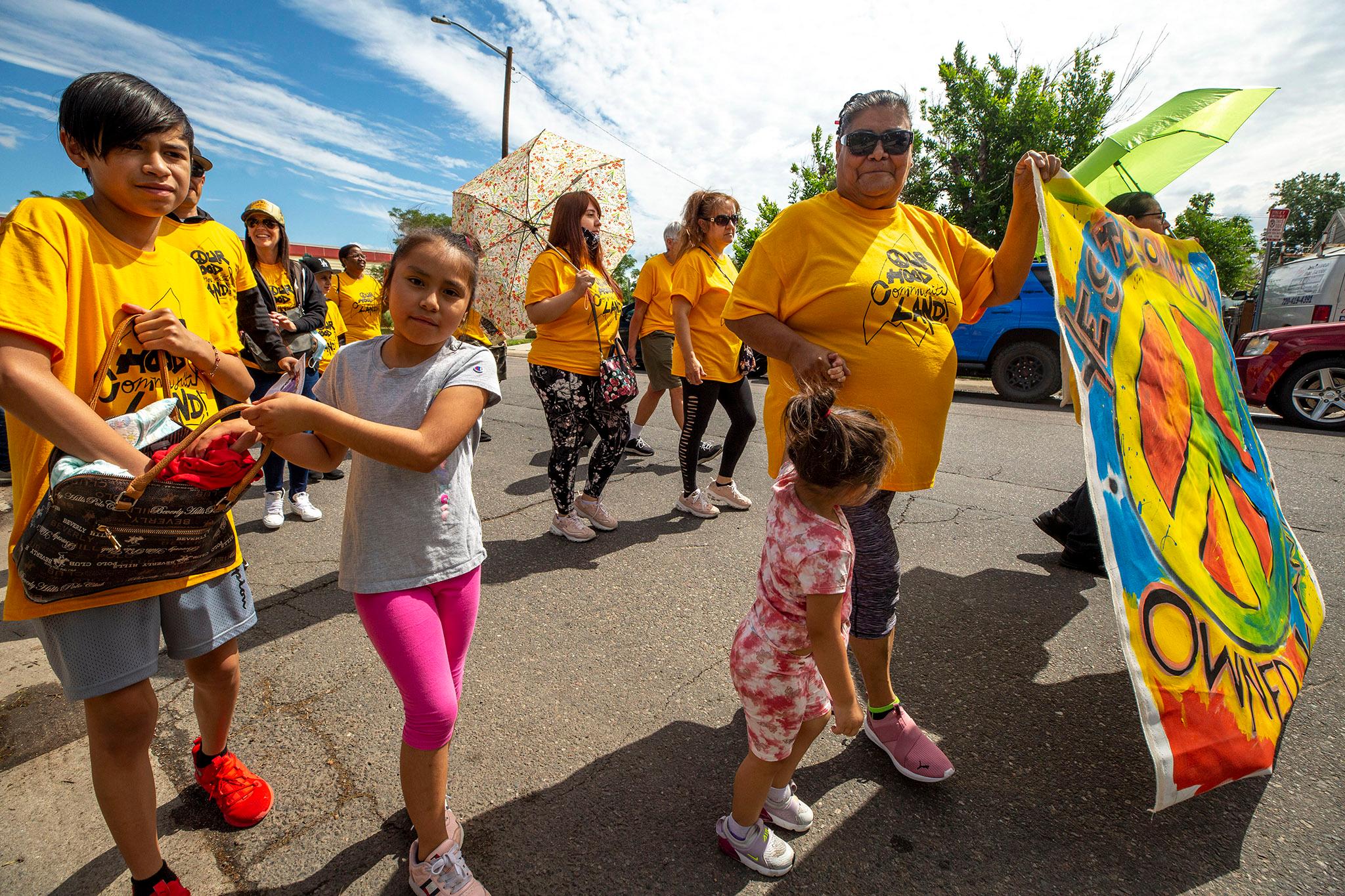
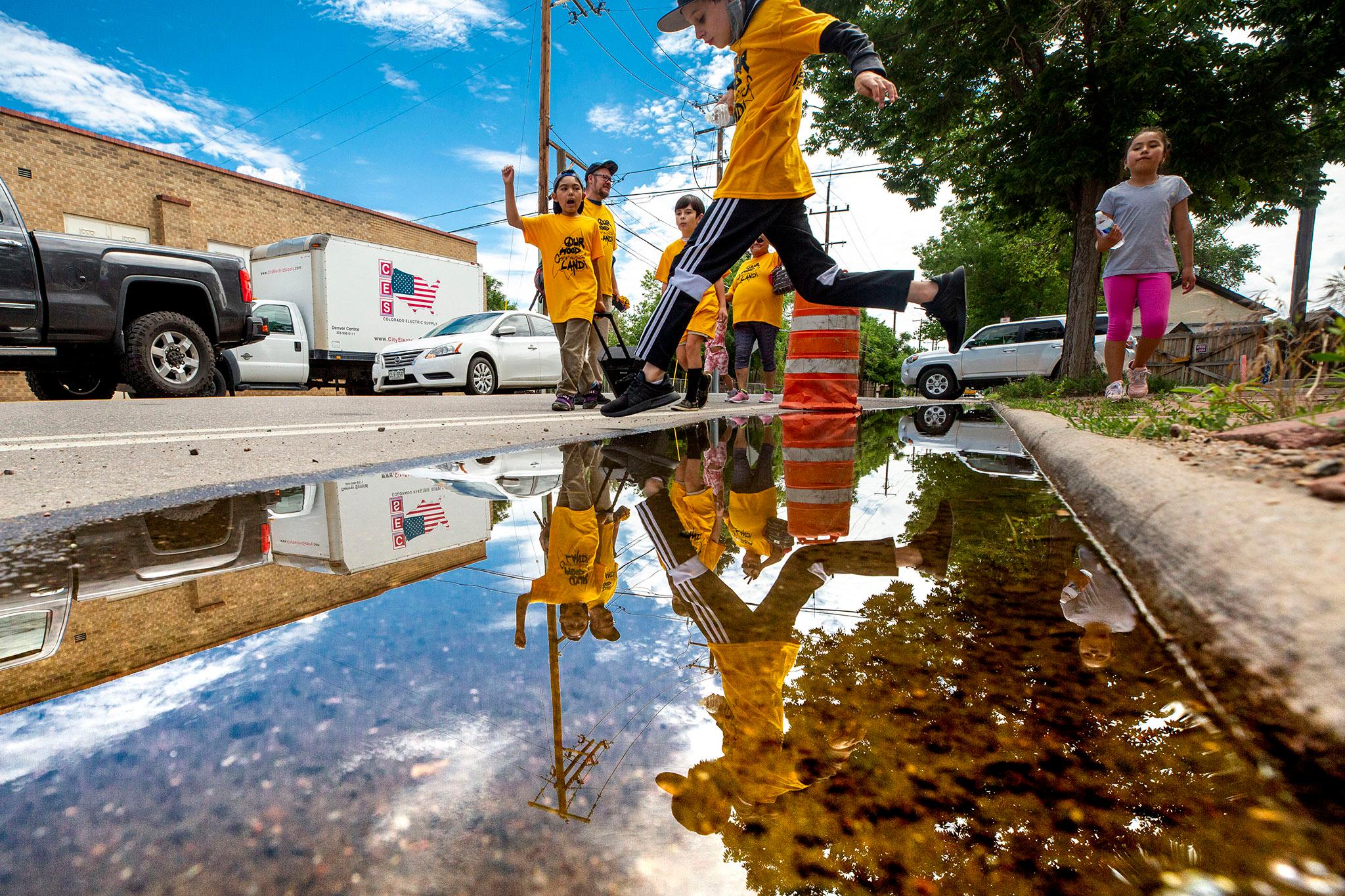
Milo Marquez, a member of the Auraria Historical Advocacy Council, called developments in the neighborhood an "urban colonization."
He was the fifth generation of his family to live in Elyria Swansea, and he watched as real estate investors moved in, offering cash, to gobble up houses as valuations across the city inflamed. He described a future in which displaced, working-class families live in the suburbs and only venture into Denver to clean offices or fix cars.
"There's no other place for them to go, and there's no other place for us to go," he said. "Once we sell our houses here where are we gonna go? Brighton? Lochbuie? We're out of the circle."
Robin Reichhardt, a longtime member of the coalition, said recent city improvements haven't done much to ensure people can actually stay in the neighborhoods. A new pedestrian bridge, which spans railroad tracks bisecting Elyria Swansea, was nice but 60 years too late. He added that true positive change hinges on a completely new way of doing business.
"It's gotta be community public partnerships, where the city actually sees the community as a partner and not as a rival," he told us as he marched up the new bridge's steps. "We got pennies to their millions and they treat us with the utmost disrespect and disdain, as if we're competing with them. And we're like, 'We need your help.'"
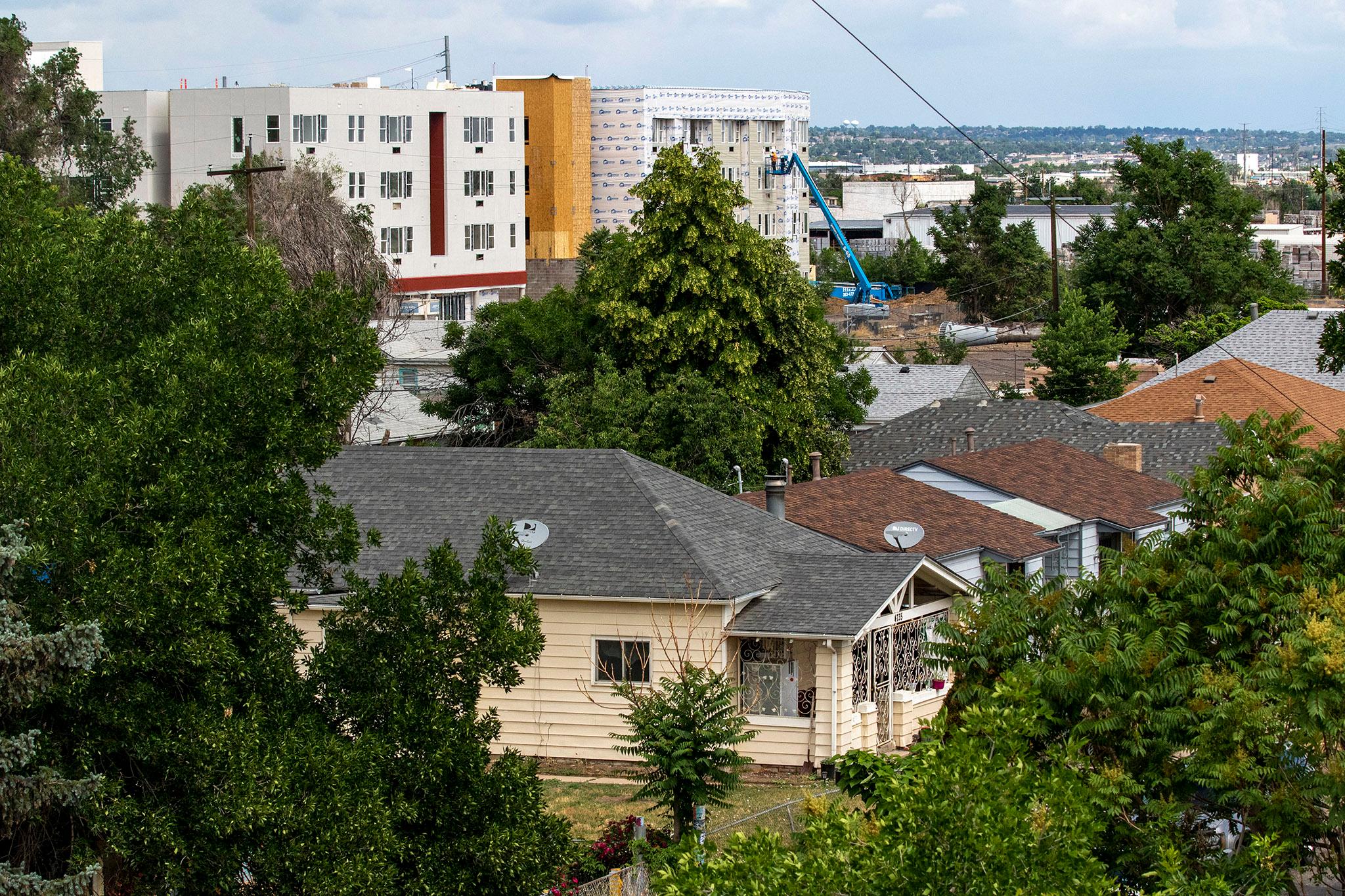
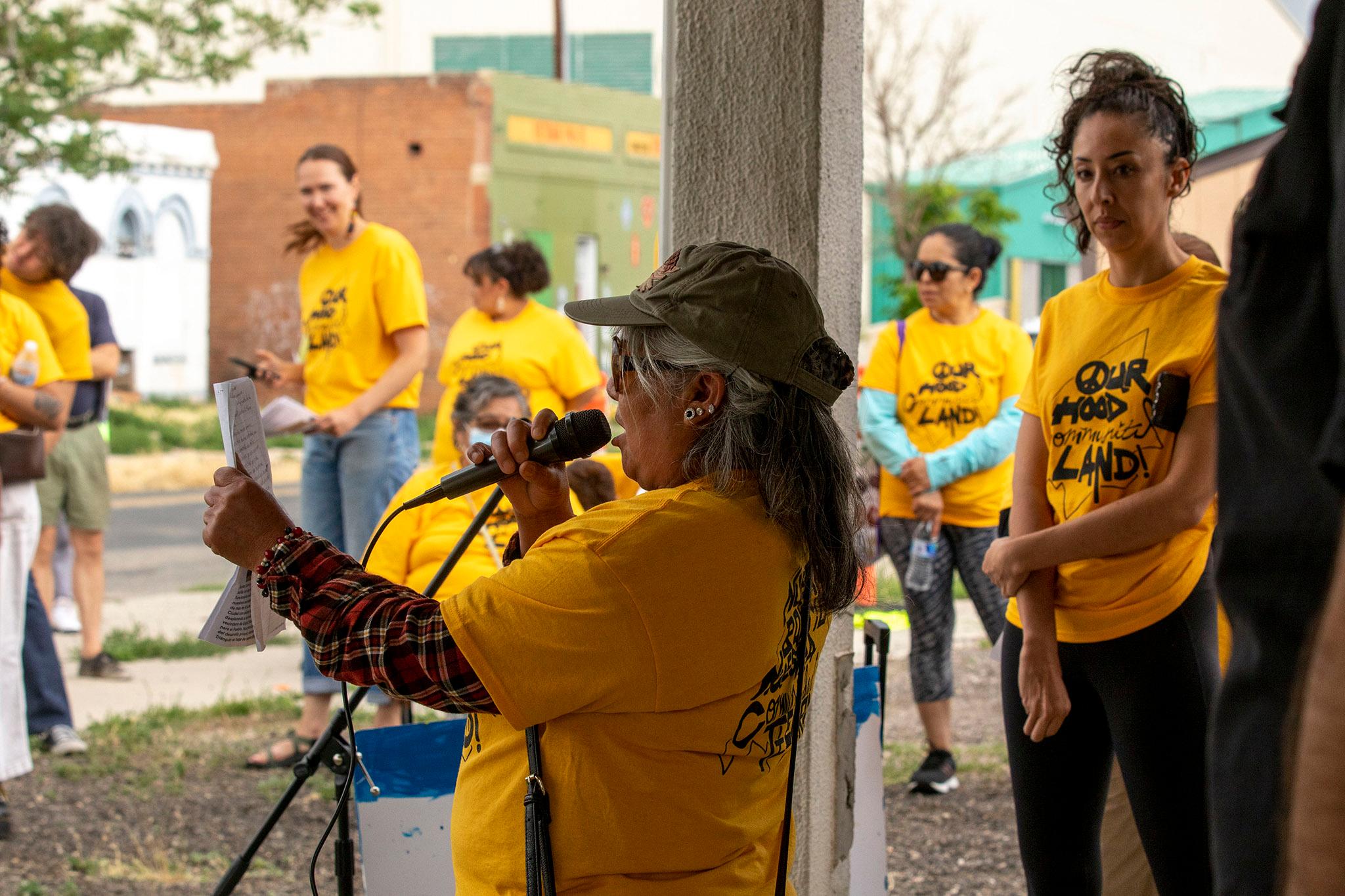
Council Member Candi CdeBaca, whose political career began in fights for this neighborhood, said the time is right to frame these ideas as acts of restorative justice. If Hancock wants reparations, she and her community's advocates have ideas.
CdeBaca suspects Hancock might try to get the Triangle project moving again if he successfully pitches a $400 million bond package to voters this November. The fate of National Western's last developable sliver is in his hands, she said.
"He could sell it off tomorrow without our approval, without our vote, anything," she said. "I think it's an opportunity, really, for all the displaced people across the city to come together and say, 'Give this to all of us.'"

